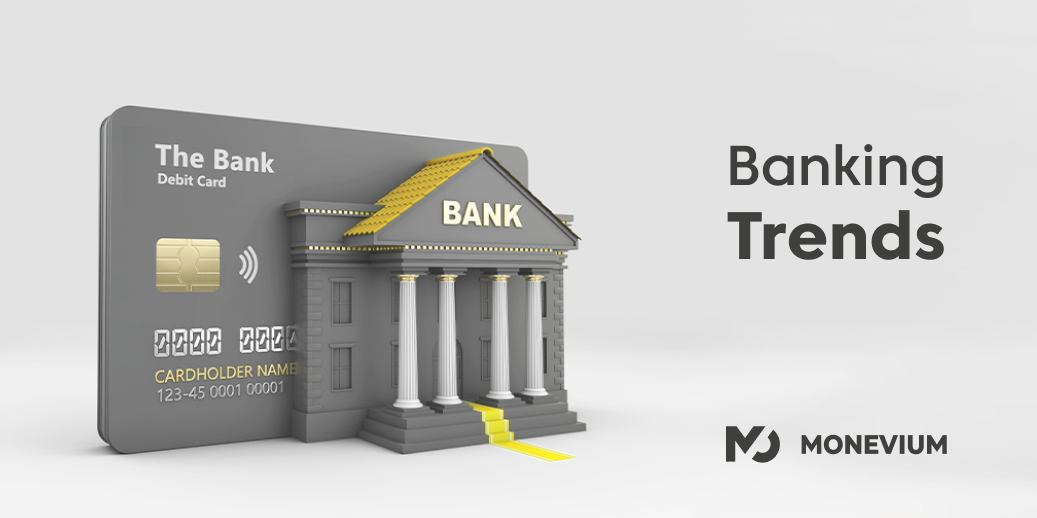Banking trends: What to expect in 2023

The financial services industry has made rapid steps in becoming a truly global business, which connects its retail and commercial customers to a seemingly endless array of products and services.
In the United Kingdom alone, internet banking has increased in use over recent years to the extent that the vast majority of personal banking customers now conduct their banking via the internet.
According to statistics from research by think tank Statista, 93% of respondents to its research on this subject were using online banking by 2022, compared to only 32% in 2007.
In conjunction with the majority of British banking customers using online banking, we are now witnessing the closure of the last few remaining high street branches by many retail and commercial banks across the United Kingdom and many parts of Europe.
Therefore, the rapid development of new technology in the banking world is now exponential, as internet-based services are far more adaptable and easier to evolve than physical banking facilities. Thus, the development cycle is now much quicker than ever and new trends occur more rapidly as the financial services industry is one of the leading business sectors when it comes to innovation.
Considering that the transition from branch banking to fully online banking is now almost complete with the last few branches looking toward closure, 2023 is likely to be a year of interesting development and changing customer experience.
On this basis, there are likely to be a few categories which banking technology will focus on.
One of them is, in keeping with many other industries, corporate responsibility and sustainability. Some of this will likely be driven by large corporate banks wishing to be viewed as responsible toward their environment and society however, today's bank customers are increasingly demanding it. Banks have recently been busy developing carbon footprint calculators, as well as implementing solutions that are less data-focused and more effective at helping consumers adopt sustainable ways of living.
Aside from appearing to move with the times and cast off the traditional image of hard-nosed corporate giants and appear more socially responsible, improving the customer experience will now likely be a major priority for many financial institutions as the online world is now where most customers operate.
With the demise of branches, it is likely that banks will have to address the 'anonymous call centre' nature of the alternative, when customers have to contact their bank. Therefore, the refinement of interactive chatbot services may well be a development area, to give customers a chance to have their questions answered efficiently without long waiting times. With the sudden virality that ChatGPT (a natural language processing tool driven by AI technology that searches a wide pool of data and sources via the internet, to provide information for users) has demonstrated recently, it is possible that some banks could implement an AI-powered ChatGPT solution as an accurate method of providing specific information to customers.
With the acceleration of the digital-only experience that most banking customers have, the expansion of digital products and payments capabilities will be a priority this year. Ever since 2020, when many people across the Western world were instructed to stay at home by their respective governments, the use of digital payments has increased exponentially, and when the lockdowns were cancelled, the buying habits of many consumers had already changed and those customers continued purchasing online.
Therefore, this year, via partnerships with payment services providers and merchant services enabling services, as well as in-house developments, a concentration on offering increasingly user-friendly and flexible payment methods is on the cards.
Security of personal capital is also a priority for most banks. The adage that what begins in America comes to Britain could well be applicable here, as research by Cornerstone released in January this year demonstrated that over 50% of consumers in North America want their banks to integrate services like identity theft protection, data breach protection, subscription management, and bill negotiation services bundled with their current accounts.
Gone are the days when the risk to a retail banking customer would be a house burglary in which cash is stolen, or an unfortunate experience at the hands of a pickpocket who can deftly remove a wallet from a pocket without the owner noticing. Today, hackers, computer software engineers and large organisations are all adept at fraudulently accessing bank accounts or convincing people to hand over their log in credentials or bank details.
Therefore, the methods of dealing with financial crime must be stepped up to be more sophisticated than the fraudsters, who are no longer back street-dwelling drop-outs but finely tuned organisations and highly educated software engineers. With the increase in the levels of sophistication in banking, so has progressed the level of sophistication of the average fraudster.
The internet itself is changing, therefore by default, the online banking world will adapt further.
Financial services firm Gartner has predicted that 25% of internet users will spend at least one hour a day in the metaverse by 2026, either for work, shopping, education, social or entertainment.
Therefore, it would be a natural progression that banking customers will view their experience as far less defined by boundaries as the virtual world of the metaverse begins to gain momentum. Digitisation and the mass transition to cashless finance already provide a relatively low-cost way to quickly scale any financial service, but the metaverse will likely go even further.
Financial transactions may well be a component of the metaverse in virtual form as well as in the real world, but from the users’ point of view, it should be free from territorial, temporal or spatial boundaries.
As far as asset classes are concerned, volatile Fiat currencies have dominated the markets over the past two years, and the rise in use of cryptocurrencies is noticeable. Should central banks begin to introduce Central Bank Digital Currencies (“CDBCs”), the consideration that these could be used to control or restrict the activities of bank customers could lead to an increased use of decentralised cryptocurrencies such as Bitcoin and Ethereum as everyday currency rather than speculative trading instruments or technological development platforms for smart contract or distributed ledger applications.
In summary, 2023 will be a year of technological advancement and furthering of the banking world in the online space. The future is here and now.
Monevium is the Trading Name of Advanced Wallet Solutions Limited, a company registered in the UK under company number 10251711 and is regulated by the UK’s Financial Conduct Authority under Firm Reference Number 766038.
Open Monevium Account in Minutes
The future of money management is only a few clicks away. Apply here to have complete control over your money.


